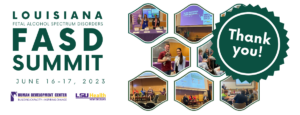Louisiana FASD Summit: Thank you!

A message from HDC Director Philip Wilson, Ph.D.
I want to take a moment to thank everyone for thier participation in the Louisiana FASD Summit last month. We were excited to see that people from 29 US states and 4 countries (Australia, Canada, Ireland, Scottland) registered (i.e., 101 for live attendance and 211 for virtual attendance), but more encouraging is that 199 people from Louisiana registered for the Summit. The interest in FASD among residents of Louisiana is evidence that our state has a solid group of stakeholders concerned with improving the system of care and quality of life of individuals with FASD, families, and caregivers.
We received fantastic input with creative, passionate discussion in the Building Engagement session that followed the Summit. I believe the Summit set a foundation for future work related to FASD in Louisiana. We hope that no matter your participation in the Summit, you will continue the journey toward raising awareness of FASD and it’s very high prevalence. We hope you continue working with our state and local partners to create responsive, comprehensive, and coordinated systems of care for individuals with FASD, their families, and caregivers while supporting professionals who serve them to adopt evidence-based strategies.
We are still digesting the minutes from the Engagement Building session. However, based on the input we received, I believe we will pursue the following topics and actions in the coming years (until we pull stakeholders together in some type of arrangement, this list is certainly not etched in stone):

- Develop a support network for people with lived experiences (i.e., families and self-advocates) and those who serve and support them (e.g., a Louisiana affiliate of FASD United).
- Raise awareness about FASD to childcare professionals, educators, healthcare, and mental health professionals as well as the general public.
- Provide information and resources to people with lived experience with FASD.
- Educate policymakers about FASD.
- Encourage and collaborate with higher education programs and faculty who train and prepare childcare professionals, educators, healthcare, and mental health professionals to recognize and provide evidence informed services and supports to people with lived experience with FASD.
- Build capacity to screen/evaluate individuals at risk of having FASD to diagnose or rule out FASD- and provide referrals/resources.
- Partner with state agencies, families, self-advocates, state/regional and local agencies, interested philanthropic organizations, and individuals to support and create an integrated and comprehensive system of care for FASD.
- Efforts around “stigma reduction” and “prevention” will likely be on the radar- but we will consider the timing and sensitivity of these activities- and need to be sure we don’t inadvertently make stigma and pushback worse by introducing these topics until we are firmly under-way with some of the other topics in this list (and/or others not included here).

Thank you again for your interest in FASD. We hope you will continue this journey with us as we move forward raising awareness of FASD in Louisiana.
We will be in touch later this summer to share the final results of the input we received, and to solicit your feedback and ideas on next steps.
Best regards,

Philip Wilson, Ph.D.
Director, Human Development Center
Professor, LSU Health Sciences Center, School of Allied Health Professions
411 South Prieur Street
New Orleans, LA 70112


 myLSUHSC
myLSUHSC